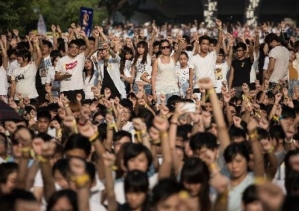
Thousands of students in Hong Kong have started a week-long boycott of classes to protest China's closed position on electoral reform in the territory.
Students from more than two dozen institutions are taking part and they began a weeklong boycott with a rally on the campus of Chinese University of Hong Kong, where they demanded that the Chinese government withdraw its election reform plan and issue an "apology to the Hong Kong people."
It is a prelude to a larger protest set for 1 October planned by pro-democracy group Occupy Central, according to the BBC, who has reporters embedded with the protestors.
Beijing has rejected open nominations for the city's executive position, turning away hopes of those seeking full democracy for the region.
The boycott is being organised by groups such as the Hong Kong Federation of Students and Scholarism.
According to Bloomberg, college freshman Joshua Wong, who founded the student activist group Scholarism, skipped his campus tour last month so he could lead hundreds of young people marching for greater democracy in Hong Kong.
This week, the 17-year-old churchgoer is among thousands of students boycotting classes to protest an electoral proposal from China's Communist Party that they say doesn't grant a genuine choice in the city's first leadership election.
"Universal suffrage is the mission of this era and this era belongs to the young people, so let the young ones complete the mission," says Wong, "Young people will always be the pioneers."
Student activists are also organising a series of rallies and public lectures in a park near government offices later in the week, and have been distributing yellow ribbons to secondary school and urging them to join the boycott.
Yellow is the chosen color of the student protest, and a symbol of support for the movement.
About 400 academics and non-teaching staff are also taking part in support of the students, reports the South China Morning Post.
More than 80 public lectures are planned, with speakers including Cardinal Joseph Zen Ze-kiun and more than 100 professors from various academic disciplines.
"As teachers and as citizens, we are pained and outraged to see the advancement of democracy in Hong Kong stifled and suppressed," read the statement, which by yesterday had been signed by 382 university staff, including 297 teaching staff.
Next month, an even larger pro-democracy protest is set to take place at Hong Kong's financial district, which critics have said may shut down the area.
The issue of how Hong Kong can choose its leader has embroiled the city in recent months, sparking protests from both the pro-democracy and pro-Beijing camps.
The Chinese government has promised direct elections for Hong Kong's leader, the chief executive, by 2017.
But in August, it ruled that voters would only have a choice from a list of two or three candidates selected by a nominating committee.
Democracy activists say China will use this committee to screen out candidates that will not go along with Beijing authority.
The protesters claim Beijing has reneged on it's promise of greater democracy Hong Kong when it was handed back to China from England in 1997.







